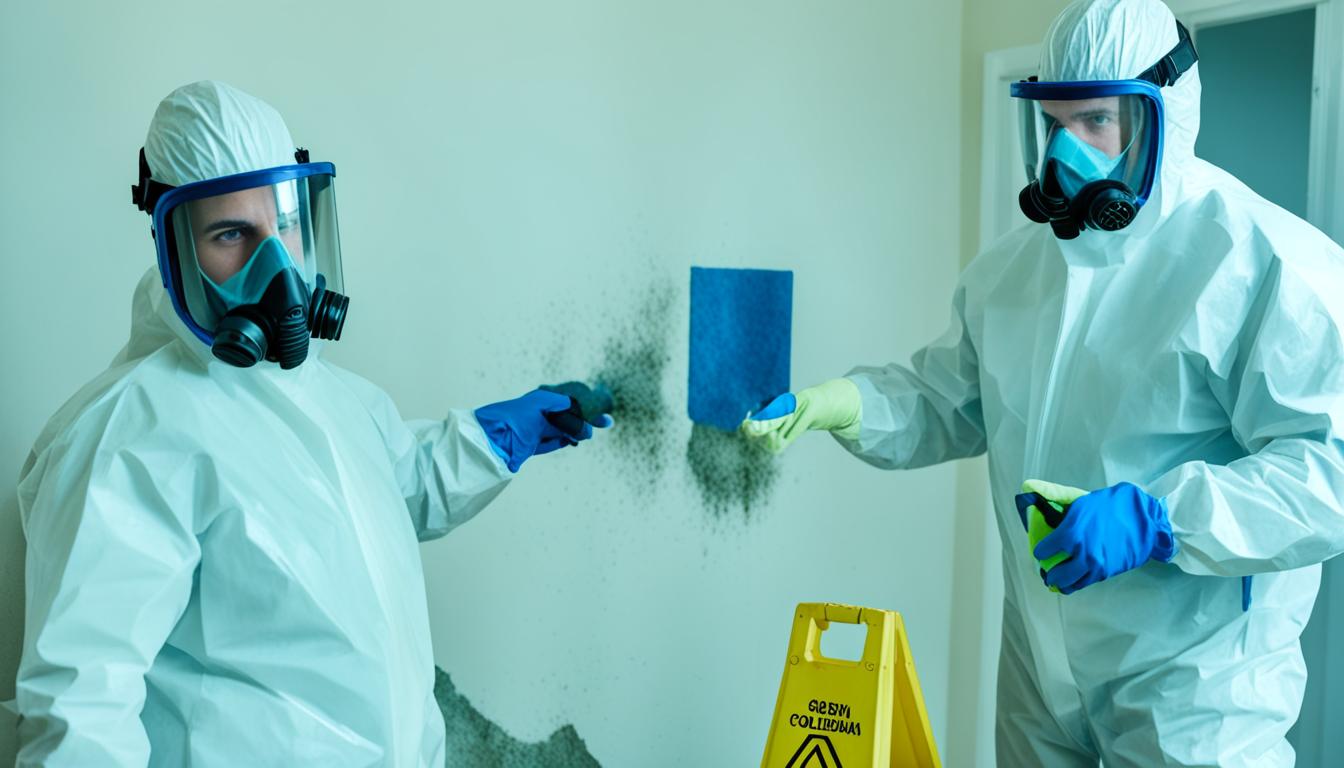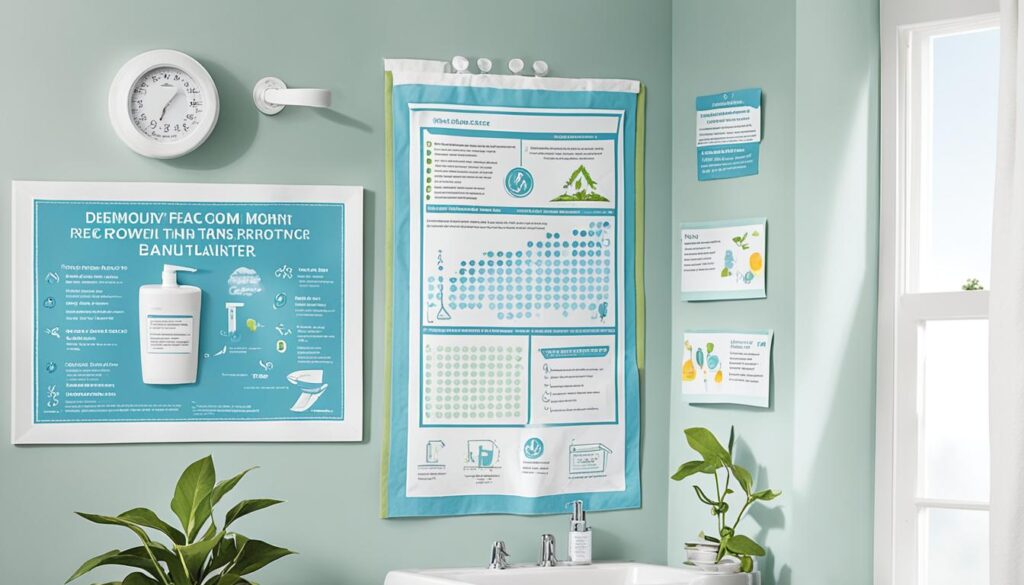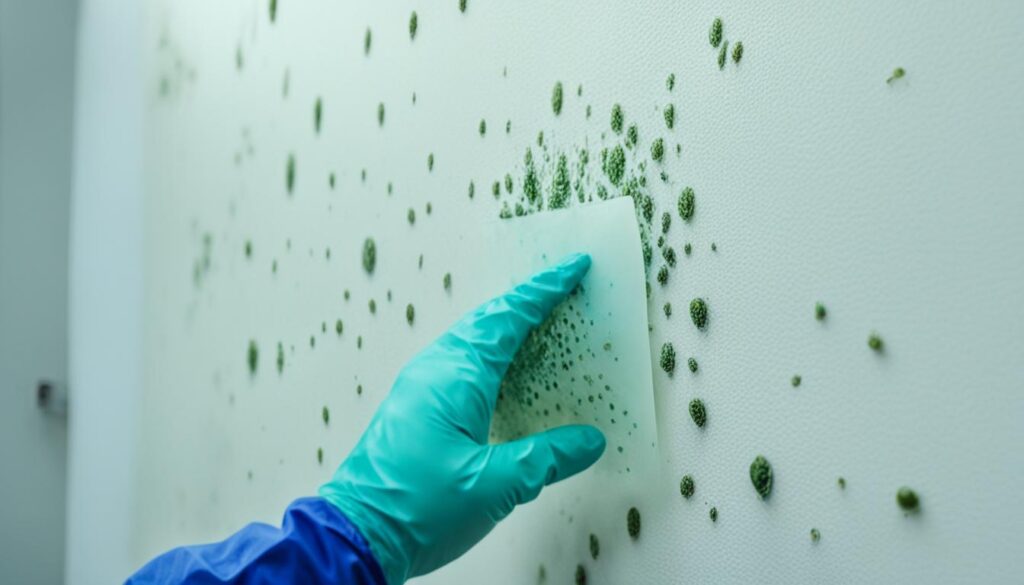
Florida Mold Remediation Safety Tips for Residents
In this section, we will provide essential mold remediation safety precautions specifically tailored for Florida residents. Protecting your home and health from mold dangers is crucial, and understanding the necessary steps to prevent and mitigate mold growth is paramount.
Key Takeaways:
- Florida residents must take mold remediation safety precautions to protect their homes and well-being.
- Understanding the necessary steps to prevent and mitigate mold growth is crucial.
- Implementing these precautions can minimize the risks associated with mold and safeguard living spaces.
- Seek professional assistance from mold remediation services for thorough assessment and resolution of mold issues.
- Stay proactive in creating a safe and healthy living environment by following the provided tips and guidelines.
Black Mold Prevention Tips for Florida Homes
Black mold can pose significant health risks and should be addressed promptly. Implementing preventive measures can help Florida homeowners minimize the risks associated with black mold and maintain a safe living environment. Here are some essential tips and guidelines to prevent black mold growth:
- Control indoor humidity levels: Keep indoor humidity levels below 50% to prevent excessive moisture that can contribute to black mold growth. Use dehumidifiers or air conditioners to achieve optimal humidity levels.
- Maintain proper ventilation: Ensure adequate ventilation in bathrooms, kitchens, and other areas prone to moisture buildup. Use exhaust fans while cooking, showering, or doing laundry to remove excess moisture and prevent mold growth.
- Address water leaks promptly: Any water leaks, whether from plumbing, roofs, or windows, should be fixed immediately. Regularly inspect your home for signs of leaks and address them promptly to prevent black mold growth.
- Monitor and maintain gutters: Clean and maintain your gutters regularly to ensure proper water drainage. This prevents water from accumulating near the foundation of your home and reduces the risk of moisture infiltration.
- Proper insulation: Make sure your home is properly insulated to prevent condensation that can lead to moisture accumulation. Insulate windows, walls, and pipes to reduce the chances of black mold growth.
- Ensure proper airflow: Arrange furniture and belongings in a way that allows for proper airflow. Avoid blocking vents or placing objects against walls to promote air circulation and prevent moisture buildup.
- Use mold-resistant materials: When renovating or remodeling your home, opt for mold-resistant materials. These materials are specially designed to resist mold growth and can help safeguard your home against black mold.
- Regularly clean and inspect: Regularly clean areas prone to moisture, such as bathrooms and basements, using mold-inhibiting cleaners. Additionally, inspect hidden areas, such as behind furniture and under carpets, to detect any signs of mold growth early on.
- Ensure proper drainage: Ensure that the grading around your home promotes proper water drainage. Properly sloping the ground away from your foundation can help prevent water accumulation and reduce the likelihood of black mold.
- Professional mold inspection: Consider hiring a professional mold inspection service to assess your home for any hidden mold growth. Professional inspections can identify mold sources that may be difficult to detect on your own.
By following these black mold prevention tips, Florida homeowners can increase their awareness of mold growth and take proactive measures to protect their homes and health. Remember, early prevention is key to minimizing the risks associated with black mold.

Mold Inspection and Removal Best Practices
When it comes to addressing mold issues in your Florida home, following proper techniques and best practices is essential for effective mold inspection and removal. By understanding the guidelines laid out below, residents can take the necessary precautions and ensure the safe and thorough eradication of mold.
1. Conduct a Comprehensive Mold Inspection:
To begin the mold remediation process, it is crucial to conduct a thorough mold inspection. Engage the services of a certified mold inspector who will assess the extent of mold growth, identify the type of mold present, and determine the underlying causes. This inspection will provide the foundation for developing an effective remediation plan.
2. Implement Mold Spore Containment Measures:

To prevent the spread of mold spores during the removal process, proper containment measures must be implemented. This includes isolating the affected area using heavy-duty plastic sheeting and sealing off any vents, doors, or openings. Negative air pressure should be established to ensure that mold spores do not escape into adjacent areas.
3. Use Personal Protective Equipment (PPE):
Before initiating the mold removal process, ensure that all individuals involved are equipped with proper personal protective equipment (PPE) to safeguard against potential health risks. PPE may include gloves, goggles, masks, disposable coveralls, and shoe covers. The use of appropriate PPE is crucial to prevent exposure to mold spores and other contaminants.
4. Follow Industry-Approved Mold Removal Techniques:
Adhering to industry-approved mold removal techniques is vital to ensure the complete eradication of mold. This may involve physically removing affected materials, such as drywall or carpeting, or utilizing specialized mold remediation products. It is important to carefully follow the manufacturer’s instructions and conduct thorough cleaning and disinfection after the removal process.
5. Monitor and Test for Mold Resurgence:
Once the mold removal process is complete, regular monitoring and testing should be conducted to ensure that mold does not resurface. This includes visual inspections and air quality testing to detect any signs of mold growth or airborne mold spores. Prompt action should be taken if any mold resurgence is identified.
6. Seek Professional Assistance:
While minor mold issues can sometimes be handled by homeowners, it is often advisable to seek professional assistance for significant mold infestations or if you have concerns about your ability to effectively address the problem. Certified mold remediation experts have the necessary training, experience, and equipment to safely and thoroughly remove mold from your Florida home.
“Proper mold inspection techniques, strict containment measures, and adherence to industry best practices are crucial for successful mold remediation. By following these guidelines, Florida residents can ensure a safe and effective mold removal process.”
| Benefits of following mold inspection and removal best practices: | Consequences of ignoring mold inspection and removal guidelines: |
|---|---|
|
|
Protecting Against Mold Allergies and Toxic Mold Exposure
Mold-related allergies and exposure to toxic molds can pose significant risks to respiratory health. Therefore, it is crucial for Florida residents to take proactive measures to reduce exposure and create a healthier living environment.
Preventing Mold Allergies
To prevent mold-related allergies, follow these essential steps:
- Keep indoor humidity levels below 50%: Use dehumidifiers and air conditioners to control the humidity in your home.
- Fix leaks promptly: Repair any water leaks in your plumbing, roof, or windows to prevent moisture buildup and mold growth.
- Improve ventilation: Increase airflow throughout your home by opening windows, using exhaust fans in bathrooms and kitchens, and keeping closet doors open.
- Regularly clean and dry surfaces: Regularly clean and dry areas prone to moisture, such as bathrooms, kitchens, and basements.
- Use mold-resistant products: Opt for mold-resistant paints, drywall, and flooring materials in susceptible areas.
Minimizing Toxic Mold Exposure
When dealing with toxic molds, additional mitigation steps should be taken:
- Wear protective gear: When cleaning up mold or handling moldy materials, wear gloves, goggles, and a mask to minimize exposure to spores and mycotoxins.
- Seal off the affected area: Use plastic sheets or barriers to isolate the mold-contaminated area and prevent the spread of spores to other parts of the home.
- Properly dispose of moldy materials: Bag and discard moldy materials in sealed containers to avoid releasing spores into the air.
- Consider professional mold remediation: For significant mold infestations or toxic mold species, it’s advisable to seek assistance from professional mold remediation specialists who can safely remove the mold and restore your home.
Taking these mold mitigation steps can significantly reduce the risks of mold-related allergies and toxic mold exposure, ensuring a safer and healthier living environment for Florida residents.
“Prevention is the key when it comes to protecting against mold allergies and toxic mold exposure. By implementing these mitigation measures, Florida residents can safeguard their respiratory health and create a mold-free environment in their homes.” – Dr. Natalie Thompson, Allergist
| Common Mold Allergy Symptoms | Toxic Mold Sources |
|---|---|
| Nasal congestion | Flooded basements |
| Sneezing | Leaking roofs |
| Coughing | Plumbing leaks |
| Wheezing | Poorly ventilated bathrooms |
| Itchy, watery eyes | High humidity areas |
Conclusion
In conclusion, taking mold remediation safety precautions is of utmost importance for Florida residents in order to protect their homes and ensure the well-being of their families. By following the provided tips and guidelines, homeowners can effectively prevent and address mold growth, creating a safe and healthy living environment.
If you suspect mold in your home, it is crucial to take immediate action. Contacting a professional mold remediation service such as Fix Mold Miami at 305-465-6653 for a thorough assessment and assistance in resolving the issue is highly recommended. Their experienced team can help identify the extent of the mold problem and provide effective solutions to eradicate it.
Don’t delay in addressing mold issues as they can lead to serious health problems and structural damage to your home. By prioritizing mold remediation and adhering to expert advice, you can maintain a mold-free environment and protect the value and integrity of your property.




